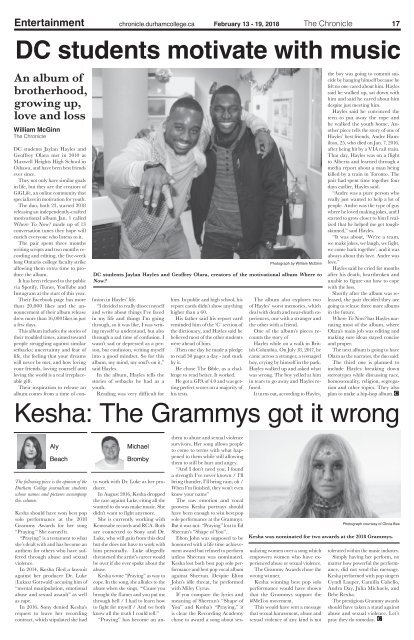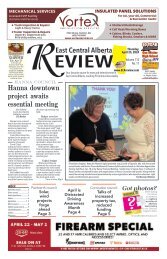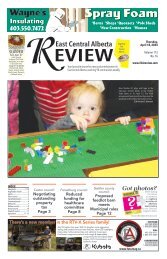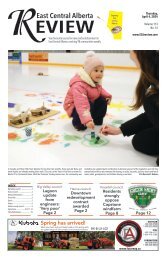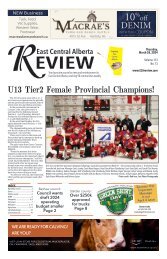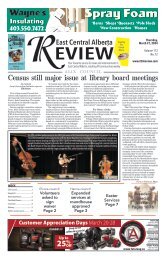Create successful ePaper yourself
Turn your PDF publications into a flip-book with our unique Google optimized e-Paper software.
Entertainment chronicle.durhamcollege.ca February 13 - 19, 20<strong>18</strong> The <strong>Chronicle</strong> <strong>17</strong><br />
DC students motivate with music<br />
An album of<br />
brotherhood,<br />
growing up,<br />
love and loss<br />
William McGinn<br />
The <strong>Chronicle</strong><br />
DC students Jaylan Hayles and<br />
Geoffrey Olara met in 2010 at<br />
Maxwell Heights High School in<br />
Oshawa, and have been best friends<br />
ever since.<br />
They not only have similar goals<br />
in life, but they are the creators of<br />
GiGLife, an online community that<br />
specializes in motivation for youth.<br />
The duo, both 23, started 20<strong>18</strong><br />
releasing an independently-crafted<br />
motivational album Jan. 1 called<br />
Where To Now? made up of 13<br />
conversation tunes they hope will<br />
enrich everyone who listens to it.<br />
The pair spent three months<br />
writing scripts and two months recording<br />
and editing, the five-week<br />
long Ontario college faculty strike<br />
allowing them extra time to produce<br />
the album.<br />
It has been released to the public<br />
via Spotify, iTunes, YouTube and<br />
Instagram at the start of this year.<br />
Their Facebook page has more<br />
than 20,000 likes and the announcement<br />
of their album release<br />
drew more than 16,000 likes in just<br />
a few days.<br />
This album includes the stories of<br />
their troubled times, aimed toward<br />
people struggling against similar<br />
setbacks; uncertainty and fear of<br />
life, the feeling that your dreams<br />
will never be met, and how loving<br />
your friends, loving yourself and<br />
loving the world is a real irreplaceable<br />
gift.<br />
Their inspiration to release an<br />
album comes from a time of confusion<br />
in Hayles’ life.<br />
“I decided to really dissect myself<br />
and write about things I’ve faced<br />
in my life and things I’m going<br />
through, so it was like, I was writing<br />
myself to understand, but also<br />
through a sad time of confusion. I<br />
wasn’t sad or depressed as a person,<br />
but confusion, writing myself<br />
into a good mindset. So for this<br />
album, my mind, my soul’s on it,”<br />
said Hayles.<br />
In the album, Hayles tells the<br />
stories of setbacks he had as a<br />
youth.<br />
Reading was very difficult for<br />
him. In public and high school, his<br />
report cards didn’t show anything<br />
higher than a 60.<br />
His father said his report card<br />
reminded him of the ‘C’ section of<br />
the dictionary, and Hayles said he<br />
believed most of the other students<br />
were ahead of him.<br />
Then one day he made a pledge<br />
to read 50 pages a day - and stuck<br />
by it.<br />
He chose The Bible, as a challenge<br />
to read better. It worked.<br />
He got a GPA of 4.0 and was getting<br />
perfect scores on a majority of<br />
his tests.<br />
Photograph by William McGinn<br />
DC students Jaylan Hayles and Geoffrey Olara, creators of the motivational album Where to<br />
Now?<br />
The album also explores two<br />
of Hayles’ worst memories, which<br />
deal with death and near-death experiences,<br />
one with a stranger and<br />
the other with a friend.<br />
One of the album’s pieces recounts<br />
the story of<br />
Hayles while on a walk in British<br />
Columbia. On July <strong>18</strong>, 20<strong>17</strong>, he<br />
came across a stranger, a teenaged<br />
boy, crying by himself in the park.<br />
Hayles walked up and asked what<br />
was wrong. The boy yelled at him<br />
in tears to go away and Hayles refused.<br />
It turns out, according to Hayles,<br />
the boy was going to commit suicide<br />
by hanging himself because he<br />
felt no one cared about him. Hayles<br />
said he walked up, sat down with<br />
him and said he cared about him<br />
despite just meeting him.<br />
Hayles said he convinced the<br />
teen to put away the rope and<br />
he walked the youth home. Another<br />
piece tells the story of one of<br />
Hayles’ best friends, Andre Hamilton,<br />
25, who died on Jan. 7, 2016,<br />
after being hit by a VIA rail train.<br />
That day, Hayles was on a flight<br />
to Alberta and learned through a<br />
media report about a man being<br />
killed by a train in Toronto. The<br />
pair had spent time together four<br />
days earlier, Hayles said.<br />
“Andre was a pure person who<br />
really just wanted to help a lot of<br />
people. Andre was the type of guy<br />
where he loved making jokes, and I<br />
started to grow closer to him I realized<br />
that he helped me get toughskinned,”<br />
said Hayles.<br />
“It was about, ‘We’re a team,<br />
we make jokes, we laugh, we fight,<br />
we come back together’, and it was<br />
always about this love. Andre was<br />
love.”<br />
Hayles said he cried for months<br />
after his death, heartbroken and<br />
unable to figure out how to cope<br />
with the loss.<br />
Shortly after the album was released,<br />
the pair decided they are<br />
going to release three more albums<br />
in the future.<br />
Where To Now? has Hayles narrating<br />
most of the album, where<br />
Olara’s main job was editing and<br />
making sure ideas stayed concise<br />
and proper.<br />
The next album is going to have<br />
Olara as the narrator, the duo said.<br />
The third one is planned to<br />
include Hayles breaking down<br />
stereotypes while discussing race,<br />
homosexuality, religion, segregation<br />
and other topics. They also<br />
plan to make a hip-hop album.<br />
Kesha: The Grammys got it wrong<br />
Aly<br />
Beach<br />
The following piece is the opinion of the<br />
Durham College journalism students<br />
whose names and pictures accompnay<br />
this column.<br />
Kesha should have won best pop<br />
solo performance at the 20<strong>18</strong><br />
Grammy Awards for her song<br />
“Praying.” She earned it.<br />
“Praying” is a testament to what<br />
she’s dealt with and has become an<br />
anthem for others who have suffered<br />
through abuse and sexual<br />
violence.<br />
In 2014, Kesha filed a lawsuit<br />
against her producer Dr. Luke<br />
(Lukasz Gottwald) accusing him of<br />
“mental manipulation, emotional<br />
abuse and sexual assault” as well<br />
as rape.<br />
In 2016, Sony denied Kesha’s<br />
request to leave her recording<br />
contract, which stipulated she had<br />
Michael<br />
Bromby<br />
to work with Dr. Luke as her producer.<br />
In August 2016, Kesha dropped<br />
the case against Luke, citing all she<br />
wanted to do was make music. She<br />
didn’t want to fight anymore.<br />
She is currently working with<br />
Kemosabe records and RCA. Both<br />
are connected to Sony and Dr.<br />
Luke, who will gain from this deal<br />
but she does not have to work with<br />
him personally. Luke allegedly<br />
threatened the artist’s career would<br />
be over if she ever spoke about the<br />
abuse.<br />
Kesha wrote “Praying” as way to<br />
cope. In the song, she alludes to the<br />
abuse when she sings, “‘Cause you<br />
brought the flames and you put me<br />
through hell / I had to learn how<br />
to fight for myself / And we both<br />
know all the truth I could tell.”<br />
“Praying” has become an anthem<br />
to abuse and sexual violence<br />
survivors. Her song allows people<br />
to come to terms with what happened<br />
to them while still allowing<br />
them to still be hurt and angry.<br />
“And I don’t need you, I found<br />
a strength I’ve never known / I’ll<br />
bring thunder, I’ll bring rain, oh /<br />
When I’m finished, they won’t even<br />
know your name”<br />
The raw emotion and vocal<br />
prowess Kesha portrays should<br />
have been enough to win best pop<br />
solo performance at the Grammys.<br />
But it was not. “Praying” lost to Ed<br />
Sheeran’s “Shape of You”.<br />
Elton John was supposed to be<br />
honoured with a life time achievement<br />
award but refused to perform<br />
unless Sheeran was nominated.<br />
Kesha lost both best pop solo performance<br />
and best pop vocal album<br />
against Sheeran. Despite Elton<br />
John’s idle threat, he performed<br />
with Miley Cyrus.<br />
If you compare the lyrics and<br />
meaning of Sheeran’s “Shape of<br />
You” and Kesha’s “Praying,” it<br />
is clear the Recording Academy<br />
chose to award a song about sexualizing<br />
women over a song which<br />
empowers women who have experienced<br />
abuse or sexual violence.<br />
The Grammy Awards chose the<br />
wrong winner.<br />
Kesha winning best pop solo<br />
performance would have shown<br />
that the Grammys support the<br />
#MeToo movement.<br />
This would have sent a message<br />
that sexual harassment, abuse and<br />
sexual violence of any kind is not<br />
Photograph courtesy of Olivia Bee<br />
Kesha was nominated for two awards at the 20<strong>18</strong> Grammys.<br />
tolerated within the music industry.<br />
Simply having her perform, no<br />
matter how powerful the performance,<br />
did not send this message.<br />
Kesha performed with pop singers<br />
Cyndi Lauper, Camilla Cabello,<br />
Andra Day, Julia Michaels, and<br />
Bebe Rexha.<br />
The prestigious Grammy awards<br />
should have taken a stand against<br />
abuse and sexual violence. Let’s<br />
pray they do someday.


